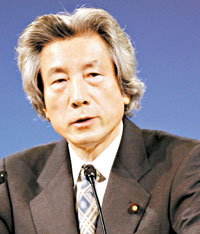|
Japan LDP seeks to lift ban on having military
(China Daily)
Updated: 2005-11-23 06:14
TOKYO: Japan's Liberal Democratic Party marked its 50th anniversary yesterday
by unveiling a proposed revision to the country's pacifist constitution that
would end the ban on possessing a military and give the armed forces a more
assertive international role.
The LDP, which has ruled Japan almost continuously since its founding in
November 1955, also adopted a new party platform.
|

Japanese Prime
Minister Junichiro Koizumi
| Prime Minister Junichiro Koizumi, addressing party loyalists assembled at a
Tokyo hotel, urged Japan to match its weight as the world's second biggest
economy by co-operating more with the international community, a reference to
the LDP's planned overhaul of the constitution.
"We need to take up the challenges of strife and conflict that may face
international society over the next 50 years," Koizumi said.
Japan's constitution drafted by US occupation forces after World War II and
unchanged since 1947 bars the country from employing military force in
international disputes and prohibits it from having a military for warfare.
But Japan has interpreted the constitution to mean it can maintain a
240,000-strong Self-Defence Force to protect itself. In 1992, the government
presented a further interpretation that enabled the dispatch of troops to
participate in international peacekeeping operations in non-combat roles.
The proposed LDP revision keeps the clause renouncing war, but removes the
need for such interpretations by clearly stipulating in the constitution itself
that Japan may keep a military force for self-defence and for participating in
international peacekeeping efforts.
"In addition to activities needed for self defence ... the defence forces can
take part in efforts to maintain international peace and security under
international co-operation, as well as to keep fundamental public order in our
country," the draft says.
The change is part of a general push by Koizumi's government to give Japan a
larger military and diplomatic profile in the world. The LDP has long campaigned
to replace the US-drafted constitution with Japan's own and made establishing a
new one the first item in its new platform, also unveiled yesterday.
"We'll never wage a war, but we should clearly state a possession of troops
for self-defence so they're not misunderstood as unconstitutional," Koizumi said
last month.
The draft constitution also weakens provisions on the separation of church
and state, saying the public institutions may engage in religious activity "in
cases within the boundary of social rituals and customary activities."
The present charter totally bans the state from religious activity.
Tokyo's relations with Beijing and Seoul have become strained in recent
months over Prime Minister Koizumi's repeated visits to Yasukuni shrine, a
symbol of militarism.
Finally, the LDP's draft would also make it easier to amend the constitution,
requiring only majorities in both houses of parliament to endorse a change
instead of the current two-thirds.
But the requirement for a majority of the population to endorse any
amendments in a national referendum would remain unchanged. Neither the existing
law nor the LDP's draft stipulates the procedures for such a referendum.
The government must first enact special legislation outlining these
procedures before proceeding with changes to the constitution.
The LDP will discuss the proposed changes with its junior coalition partner,
the New Komei Party, as well as opposition leaders.
New Komei head Takenori Kanzaki said his party will come up with its own
position on the constitution proposal by next November.
(China Daily 11/23/2005 page1)
|